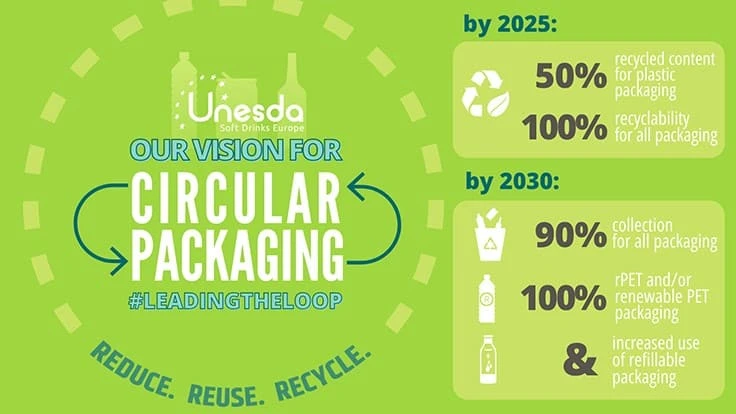
Graphic provided by Unesda.
Unesda Soft Drinks Europe has pledged to make European Union beverage packaging “fully circular by 2030,” and the Brussels-based trade association has provided steps and measures on how the beverage industry in Europe can get there.
The European soft drinks industry’s Circular Packaging Vision 2030, according to Unesda, includes 90 percent collection of all packaging for recycling; polyethylene terephthalate (PET) bottles made from 100 percent “recycled and/or renewable material” and a reduced packaging footprint and increased use of refillable packaging.
“Our goal is that beverage packaging achieves full circularity and is recognized as a resource in a circular economy: It has value, is recyclable, is collected and used as recycled content,” says Ian Ellington, Unesda president and a senior vice president with PepsiCo Europe. “We believe that packaging is a resource that should never be wasted and are taking numerous actions to achieve full circularity and support the European Commission’s agenda of accelerating the transition towards a green economy.”
In launching its Circular Packaging Vision 2030 in February, the industry says it is committing that by 2025 its packaging will be 100 percent recyclable and its PET bottles will average 50-percent-recycled content. Another goal for 2030 has soft drink PET bottles being made from 100 percent “recycled and/or renewable PET, where technically and economically feasible.”
Unesda states, “Circular packaging is designed to contain recycled content, is recyclable and possibly also reusable; it is, therefore, part of a circular economy where the waste management and recycling infrastructure allows it to be widely collected, recycled and reused.”
The soft drinks association adds, “To deliver its vision, the sector will need coherent support from EU authorities and national governments. In that category, Unesda includes protection of “the single market” and “a well-functioning secondary raw materials market that gives the soft drinks sector access to sufficient high-quality rPET in order to meet its obligations under EU law, without compromising on safety standards and avoiding downcycling.”
Latest from Recycling Today
- BMW Group, Encory launch 'direct recycling’ of batteries
- Loom Carbon, RTI International partner to scale textile recycling technology
- Goodwill Industries of West Michigan, American Glass Mosaics partner to divert glass from landfill
- CARI forms federal advocacy partnership
- Monthly packaging papers shipments down in November
- STEEL Act aims to enhance trade enforcement to prevent dumping of steel in the US
- San Francisco schools introduce compostable lunch trays
- Aduro graduates from Shell GameChanger program





